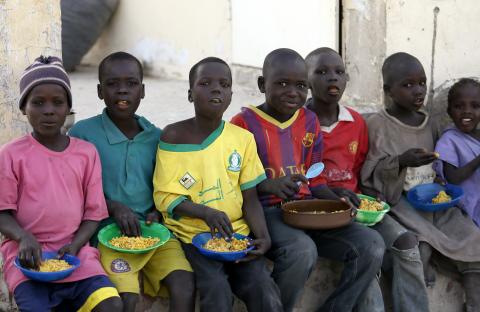Advertisement
Boko Haram attacks in Nigeria have displaced one million: UN - TRFN
DAKAR (Reuters) - More than one million people may have been forced to leave their homes in northern Nigeria by the five-year-old insurgency of Islamist sect Boko Haram, a United Nations agency said.
The militants' attacks may force even more people to flee, both internally and to Cameroon, Niger and Chad, which could destabilise the region, the International Organization for Migration (IOM) warned in a statement on Tuesday.
"We also are concerned with the regional impact of the crisis and potential threats to the peace and security of neighbouring countries, should Boko Haram's insurgency spread," said IOM Director of Operations and Emergencies Mohammed Abdiker.
The Sunni Muslim sect, which is trying to carve out an Islamic state in the largely Muslim north of the west African country, has killed thousands since 2009 in what is seen as the biggest security threat to Africa's top oil producer.
In their most recent major attack earlier this month, the insurgents are thought to have killed hundreds of people in the northern fishing town of Baga, though the death toll is unknown.
The attack forced some 13,000 residents to flee, many of whom have taken shelter on isolated islands in Lake Chad where aid agencies are struggling to reach them. Some of the refugees have drowned trying to escape.
In a separate report on Tuesday, the United Nations Children's Fund (UNICEF) said that children are suffering the dire consequences of the conflict in Nigeria, losing their homes, missing out on education and risking their lives.
In northern Cameroon, children make up 60 percent of the 25,000 Nigerian refugees living in Minawao camp, where a recent assessment revealed an alarming rate of malnutrition, UNICEF said.
In Niger, women and children make up 70 percent of the refugees in the impoverished southern region of Diffa, which has seen a sharp increase in the number of people seeking shelter, it said.
UNICEF Regional Director Manuel Fontaine said a much larger humanitarian crisis had developed over recent weeks. "We need to do everything we can to prevent the spillover effect of the violence in Nigeria on other countries in the region."
The IOM said in its report that an estimated 120,000 Nigerians had fled to neighbouring countries.
Nigerian President Goodluck Jonathan is seeking a second term in a Feb. 14 election, having come to power after the death of President Umaru Yar'Adua, a Muslim leader from the north.
Jonathan, a Christian from the southern state of Bayelsa, controversially ran for president in 2011, breaking an unwritten law in Nigerian politics that presidents must alternate between northerners and southerners.
The Boko Haram insurgency began in 2009, but the number and scale of attacks rose sharply last year after Goodluck imposed emergency rule in the three worst-hit northern states.
(Reporting by Misha Hussain; Editing by Tim Pearce)



















Add new comment